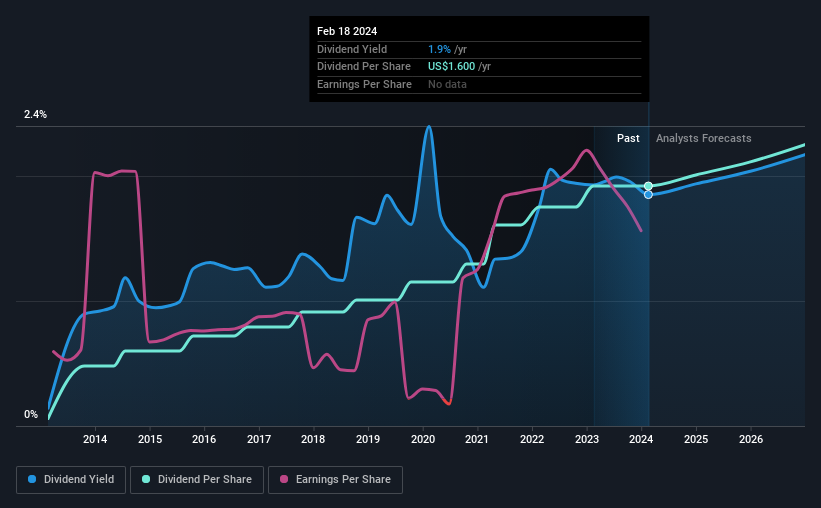There's A Lot To Like About Brunswick's (NYSE:BC) Upcoming US$0.42 Dividend
It looks like Brunswick Corporation (NYSE:BC) is about to go ex-dividend in the next 4 days. The ex-dividend date occurs one day before the record date which is the day on which shareholders need to be on the company's books in order to receive a dividend. It is important to be aware of the ex-dividend date because any trade on the stock needs to have been settled on or before the record date. Therefore, if you purchase Brunswick's shares on or after the 23rd of February, you won't be eligible to receive the dividend, when it is paid on the 15th of March.
The company's upcoming dividend is US$0.42 a share, following on from the last 12 months, when the company distributed a total of US$1.60 per share to shareholders. Last year's total dividend payments show that Brunswick has a trailing yield of 1.9% on the current share price of US$86.42. Dividends are an important source of income to many shareholders, but the health of the business is crucial to maintaining those dividends. We need to see whether the dividend is covered by earnings and if it's growing.
Check out our latest analysis for Brunswick
Dividends are usually paid out of company profits, so if a company pays out more than it earned then its dividend is usually at greater risk of being cut. Brunswick paid out a comfortable 26% of its profit last year. A useful secondary check can be to evaluate whether Brunswick generated enough free cash flow to afford its dividend. Fortunately, it paid out only 25% of its free cash flow in the past year.
It's positive to see that Brunswick's dividend is covered by both profits and cash flow, since this is generally a sign that the dividend is sustainable, and a lower payout ratio usually suggests a greater margin of safety before the dividend gets cut.
Click here to see the company's payout ratio, plus analyst estimates of its future dividends.
Have Earnings And Dividends Been Growing?
Companies with consistently growing earnings per share generally make the best dividend stocks, as they usually find it easier to grow dividends per share. If earnings decline and the company is forced to cut its dividend, investors could watch the value of their investment go up in smoke. Fortunately for readers, Brunswick's earnings per share have been growing at 17% a year for the past five years. Earnings per share are growing rapidly and the company is keeping more than half of its earnings within the business; an attractive combination which could suggest the company is focused on reinvesting to grow earnings further. Fast-growing businesses that are reinvesting heavily are enticing from a dividend perspective, especially since they can often increase the payout ratio later.
Many investors will assess a company's dividend performance by evaluating how much the dividend payments have changed over time. Brunswick has delivered an average of 41% per year annual increase in its dividend, based on the past 10 years of dividend payments. Both per-share earnings and dividends have both been growing rapidly in recent times, which is great to see.
To Sum It Up
From a dividend perspective, should investors buy or avoid Brunswick? Brunswick has been growing earnings at a rapid rate, and has a conservatively low payout ratio, implying that it is reinvesting heavily in its business; a sterling combination. Brunswick looks solid on this analysis overall, and we'd definitely consider investigating it more closely.
On that note, you'll want to research what risks Brunswick is facing. Case in point: We've spotted 3 warning signs for Brunswick you should be aware of.
A common investing mistake is buying the first interesting stock you see. Here you can find a full list of high-yield dividend stocks.
Have feedback on this article? Concerned about the content? Get in touch with us directly. Alternatively, email editorial-team (at) simplywallst.com.
This article by Simply Wall St is general in nature. We provide commentary based on historical data and analyst forecasts only using an unbiased methodology and our articles are not intended to be financial advice. It does not constitute a recommendation to buy or sell any stock, and does not take account of your objectives, or your financial situation. We aim to bring you long-term focused analysis driven by fundamental data. Note that our analysis may not factor in the latest price-sensitive company announcements or qualitative material. Simply Wall St has no position in any stocks mentioned.

